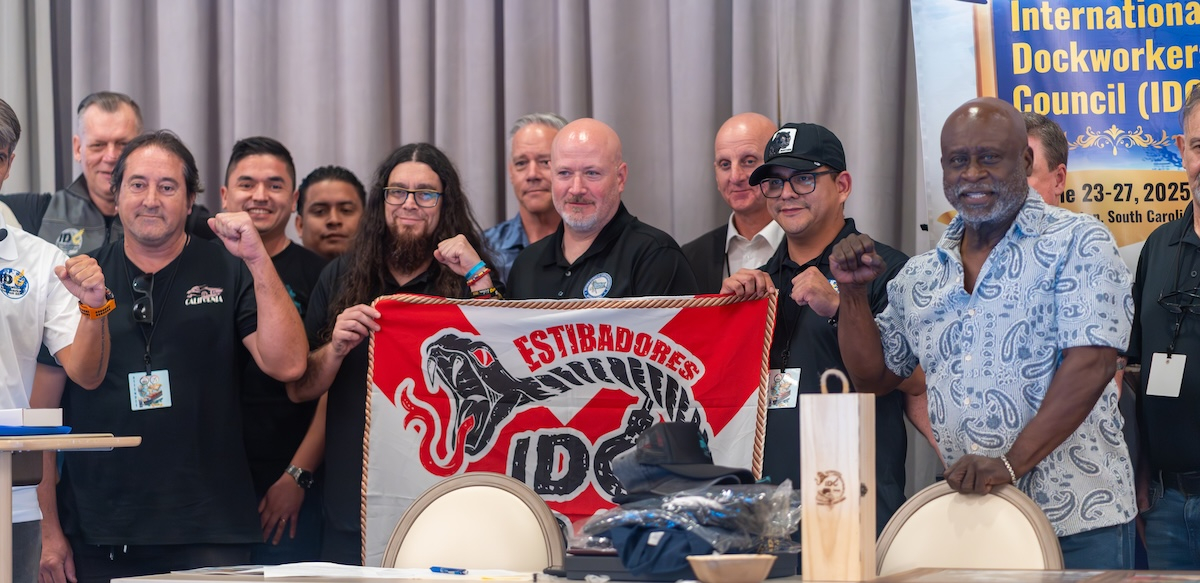Longshore Workers Remember the Struggle to Free the Charleston Five

Dock workers from Spain, England, Canada, Australia, Brazil, and the United States attended a 25th anniversary commemoration of the Charleston Five struggle in South Carolina. They also commemorated the founding of the International Dockworkers Council. Photo: Garith JaJuan.
Dockworkers from around the world reunited in South Carolina for a week in June to commemorate the 25th anniversary of the successful campaign to “Free the Charleston 5” and the founding of the International Dockworkers Council.
For nearly two years, five members of the International Longshoremen’s Association (ILA) faced felony rioting charges and prison sentences stemming from their roles in a January 2000 confrontation with police at the entrance to the Columbus Street Terminal in Charleston.
The case sparked international outcry from unions and civil rights groups, who viewed the charges as a racist attack on organized labor by politically ambitious South Carolina Attorney General Charles Condon. Four of the Five were black.
Under tremendous pressure, South Carolina dismissed the charges in November 2001. The Charleston Five avoided prison, but endured house arrest for nearly two years.
The commemorative program allowed local longshore workers and their counterparts from across the globe to remember the events of 25 years ago and to renew their commitment to one another and to international solidarity.
LOCKED OUT
Reflecting on the labor dispute that precipitated the clash with police, Ken Riley, the president of ILA Local 1422, recalled that “for the first time in my career I saw ourselves outside being locked out of the port that our ancestors built.”
Riley and his co-workers’ frustrations mounted in late 1999 as they watched Nordana Line replace them with non-union laborers. “The container ships come into the port and I’m watching the containers go on and off and all we can do is watch,” said Riley, who had recently been elected president of the local. “You had to conclude right there in your own heart and mind this is going to stop with my administration.”
Riley and other ILA leaders believed that if Nordana succeeded in ignoring union jurisdiction, other shippers would follow their lead up and down the Eastern Seaboard.
International solidarity ultimately defeated Condon, Nordana, and the state of South Carolina, said Armand Derfner, who served as an attorney for the ILA. But until the arrival of a fax from Spain, Derfner was unsure that dockworkers across the world would honor their promise to strike should the Charleston Five case ever go to trial.

SUPPORT LABOR NOTES
BECOME A MONTHLY DONOR
Give $10 a month or more and get our "Fight the Boss, Build the Union" T-shirt.
“I don't know much Spanish but I knew enough to read this, and what it said was you should know that when that day comes your brothers in Barcelona will be with you,” Derfner said. “I actually started crying because it showed how worldwide solidarity was, and how deep solidarity is. That's the meaning of all the events we're celebrating today.”
EVEN THE POPE
Four hundred dockworkers representing ports in Spain, England, Canada, Australia, and Brazil, among other countries, took part in the weeklong events in Charleston, even as they celebrated their own 25th anniversary—the founding of the International Dockworkers Council.
Paul Keating, Secretary of the Sydney Branch of the Maritime Union of Australia urged his fellow Council members to follow the lead of French and Swedish dockworkers who in recent weeks have refused to handle military materiel bound for Israel. “Comrades, in this historic anniversary of the IDC, let us come together and call for an immediate and permanent cease fire and call for the long overdue promise of a free Palestine,” he said. Other ports have been the sites of protests aimed at drawing attention to the genocide in Gaza.
From Rome, the newly ordained Pope Leo XIV, a Chicago-area native, sent greetings to the Dockworkers Council: “I am pleased to know that, as unions, you have taken on the challenge of working together to prevent job losses caused by automation, while at the same time ensuring equal and fair conditions, as well as job security for all workers, without discrimination.”
Riley and other speakers praised the delegations of dockworkers, as well as West Coast longshore workers from the International Longshore and Warehouse Union, for raising funds and awareness on behalf of the Charleston Five. Riley singled out the ILWU for donating to the campaign even before his own international union officials lent their support to the struggle.
“I know I'm not going to be here 25 years from now, but for those who will be, keep this thing alive, keep fighting,” said Riley. “There's a lot of hard work, blood sweat and tears, and death on those docks that got us where we are today.”
Later the longshore workers visited the International African American Museum, which proved a fitting site for their gathering. The museum, which opened in 2023, emphasizes the global context of the African American experience. As Brazilian dockworkers chatted with their Spanish counterparts regarding the challenges of automation and the efforts of their employers to undermine their job security, others discovered exhibits and artifacts that touched upon their own countries’ roles in slavery and global trade, as well as their historic links to Charleston.
Kerry Taylor is a member of the Charleston Workers Center.





